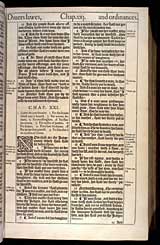Commentary for Exodus 21
Laws respecting servants. (1-11) Judicial laws. (12-21) Judicial laws. (22-36)1-11 The laws in this chapter relate to the fifth and sixth commandments; and though they differ from our times and customs, nor are they binding on us, yet they explain the moral law, and the rules of natural justice. The servant, in the state of servitude, was an emblem of that state of bondage to sin, Satan, and the law, which man is brought into by robbing God of his glory, by the transgression of his precepts. Likewise in being made free, he was an emblem of that liberty wherewith Christ, the Son of God, makes free from bondage his people, who are free indeed; and made so freely, without money and without price, of free grace.
12-21 God, who by his providence gives and maintains life, by his law protects it. A wilful murderer shall be taken even from God's altar. But God provided cities of refuge to protect those whose unhappiness it was, and not their fault, to cause the death of another; for such as by accident, when a man is doing a lawful act, without intent of hurt, happens to kill another. Let children hear the sentence of God's word upon the ungrateful and disobedient; and remember that God will certainly requite it, if they have ever cursed their parents, even in their hearts, or have lifted up their hands against them, except they repent, and flee for refuge to the Saviour. And let parents hence learn to be very careful in training up their children, setting them a good example, especially in the government of their passions, and in praying for them; taking heed not to provoke them to wrath. Through poverty the Israelites sometimes sold themselves or their children; magistrates sold some persons for their crimes, and creditors were in some cases allowed to sell their debtors who could not pay. But "man-stealing," the object of which is to force another into slavery, is ranked in the New Testament with the greatest crimes. Care is here taken, that satisfaction be made for hurt done to a person, though death do not follow. The gospel teaches masters to forbear, and to moderate threatenings, #Eph 6:9|, considering with Job, What shall I do, when God riseth up? #Job 31:13,14|.
22-36 The cases here mentioned give rules of justice then, and still in use, for deciding similar matters. We are taught by these laws, that we must be very careful to do no wrong, either directly or indirectly. If we have done wrong, we must be very willing to make it good, and be desirous that nobody may lose by us.
Commentary by Matthew Henry, 1710.
12-21 God, who by his providence gives and maintains life, by his law protects it. A wilful murderer shall be taken even from God's altar. But God provided cities of refuge to protect those whose unhappiness it was, and not their fault, to cause the death of another; for such as by accident, when a man is doing a lawful act, without intent of hurt, happens to kill another. Let children hear the sentence of God's word upon the ungrateful and disobedient; and remember that God will certainly requite it, if they have ever cursed their parents, even in their hearts, or have lifted up their hands against them, except they repent, and flee for refuge to the Saviour. And let parents hence learn to be very careful in training up their children, setting them a good example, especially in the government of their passions, and in praying for them; taking heed not to provoke them to wrath. Through poverty the Israelites sometimes sold themselves or their children; magistrates sold some persons for their crimes, and creditors were in some cases allowed to sell their debtors who could not pay. But "man-stealing," the object of which is to force another into slavery, is ranked in the New Testament with the greatest crimes. Care is here taken, that satisfaction be made for hurt done to a person, though death do not follow. The gospel teaches masters to forbear, and to moderate threatenings, #Eph 6:9|, considering with Job, What shall I do, when God riseth up? #Job 31:13,14|.
22-36 The cases here mentioned give rules of justice then, and still in use, for deciding similar matters. We are taught by these laws, that we must be very careful to do no wrong, either directly or indirectly. If we have done wrong, we must be very willing to make it good, and be desirous that nobody may lose by us.
Commentary by Matthew Henry, 1710.
